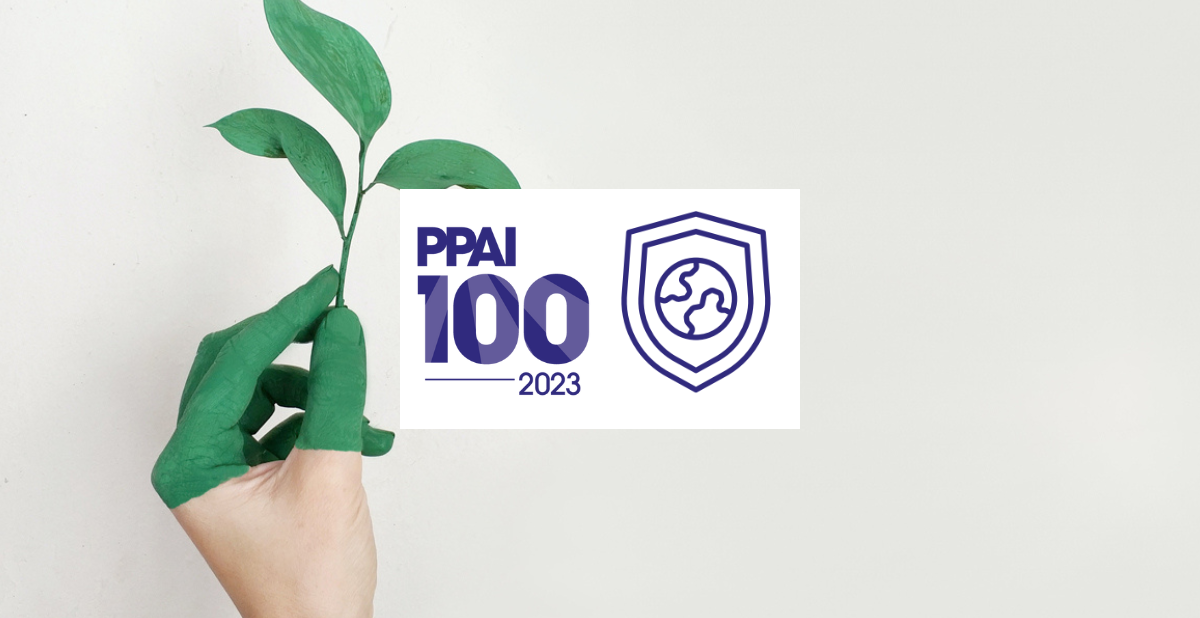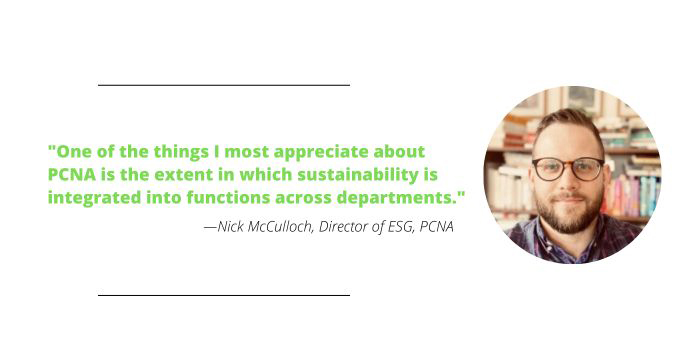How PCNA Earned High Marks For Responsibility

For 2023 and beyond, there may be no more important way to exemplify leadership in the promotional products industry than through responsibility.
PCNA (PPAI 113079, S15) has integrated responsibility into many of the decisions that define its business. The supplier, headquartered in the Pittsburgh area and No. 7 on the inaugural PPAI 100 supplier list of the industry’s leading companies, is even helping its clients meet their customers’ environmental, social and governance (ESG) and product responsibility objectives through its ProudPath online platform.
But this is a never-ending journey, and PCNA isn’t resting on what it’s done so far, recently enhancing its investment in responsibility with the addition of a new director of ESG, Nick McCulloch.
PPAI Media recently spoke with McCulloch on how the company approaches its sustainability goals and operations. McCulloch joined PCNA in February 2023, and says he found a company very much headed in the right direction, and ready to accelerate its leadership efforts.
PPAI Media: Kudos to you and all of PCNA for the high marks you’ve earned for responsibility through our research. What can you tell us about the sustainability leadership at PCNA? How does it integrate into the rest of the business?
Nick McCulloch: One of the things I most appreciate about PCNA is the extent in which sustainability was already integrated into functions across departments when I arrived.
In the interview process, I heard consistently from our executive team that sustainability was a major focus for the company, but it wasn’t until after joining PCNA that I could see firsthand the strong foundation that already existed.
Every team including product development, compliance, operations, HR, strategy, marketing and supply chain was working on at least one and often several environmental and socially focused projects. In my experience, that’s not common for an organization without a formal sustainability leader.
This allowed me to bypass much of the typical groundwork and jump straight into coordinating a highly motivated and knowledgeable team on advanced projects to elevate PCNA to an even higher level than the rest of the industry.
READ MORE: See the full PPAI 100 rankings.
PPAI Media: You’re still new, but those fresh eyes are valuable here: What is the great leap forward in sustainability that our industry needs to take? And what do you think would be necessary for us to achieve it, collectively?
McCullough: The industry is moving in the right direction – recognizing that the key to sustainability in the consumer sector is lowering our value chain emissions.
At PCNA we are focused on greater recycled and renewable inputs, sustainable sourcing, extending the lifespan of products, packaging reduction or converting to sustainable packaging materials, and increasing our use of renewable energy.
The key to accelerating that progress is to get more distributors and suppliers on board and committed to that vision. We can get there faster, together!
PPAI Media: One of the immediate topics of concern for the industry as a whole – you’ve stepped right into it in this new role – is greenwashing. What standards do your products need to meet for PCNA to greenlight marketing them as sustainable? What is your training like across the company to protect against greenwashing?
McCulloch: I am excited by the growth of green and sustainable product segments. However, the decision-making process to purchase a sustainable alternative can be difficult for customers in the promo industry. Not only does our industry use different terms – “green”, “eco-friendly”, “carbon neutral” – but the terms are not used consistently and often aren’t substantiated.
PCNA’s goal is to empower customers by making decisions easier with clarity, transparency and substantiation. This is aligned with what the FTC is trying to achieve and we embrace their approach.
To qualify for ProudPath, a product must yield a measurable, verifiable social or environmental benefit, and that benefit must be “additional” – meaning it must go above and beyond a conventional offering. This ensures when our customers choose a ProudPath-verified product they can be assured it is meeting the highest standards.
Regarding greenwashing, we have taken steps to protect our claims as this is critical as a leader in the industry. We developed an ethical marketing policy and are actively engaging our sales and marketing teams as well as our customers with educational tools.

PPAI Media: PCNA has a waste diversion program of some kind of another at 100% of its facilities. What is the most difficult piece of implementing waste diversion programs, from your experience?
McCulloch: Successful diversion of waste requires consistent adherence to process. I came to PCNA from the recycling industry, and I've done a fair share of facility audits. The first time I walked a PCNA facility floor, I was in awe of how clean and well laid out they were – everything had its place in a flow, including the capture of recyclable materials. Make eliminating waste a priority, build a process around that commitment and the results will come.
PPAI Media: There is more to corporate social responsibility than sustainability, of course. What has been the response to the DEI training PCNA has done, and what advice do you have for companies interested in exploring it?
McCulloch: Successful DEI training programs start with the understanding that context is critical. For example, cultural sensitivity training is likely to be more impactful in more culturally diverse organizations where inclusive management training is likely to be more impactful if you’re looking to start from the top down.
What is more important than the selection of any training modality is the fundamental willingness to change. Our CEO, Neil Ringel, understands that action is more important than words when it comes to justice, equity and diversity to affect material change in the lives of those you are trying to impact.
In addition, Marilyn Figlar, our CHRO, has done fantastic work addressing structural issues that underpin systematic inequities and lacking diversity. We have focused on racial justice where we adopted fair-chance/second-chance employment practices, which disproportionately impacts BIPOC communities, and reinforce our support of diversity and community with a partnership with a Pittsburgh non-profit.
PCNA is also proud of a program where we employ recently relocated Afghan refugees by removing barriers ranging from a lack of reliable transportation to a lack of formal education by offering transportation at no cost plus an upskilling program that allows for career advancement.
The results speak for themselves – since we began these types of programs, our inclusion metrics have been very high.

